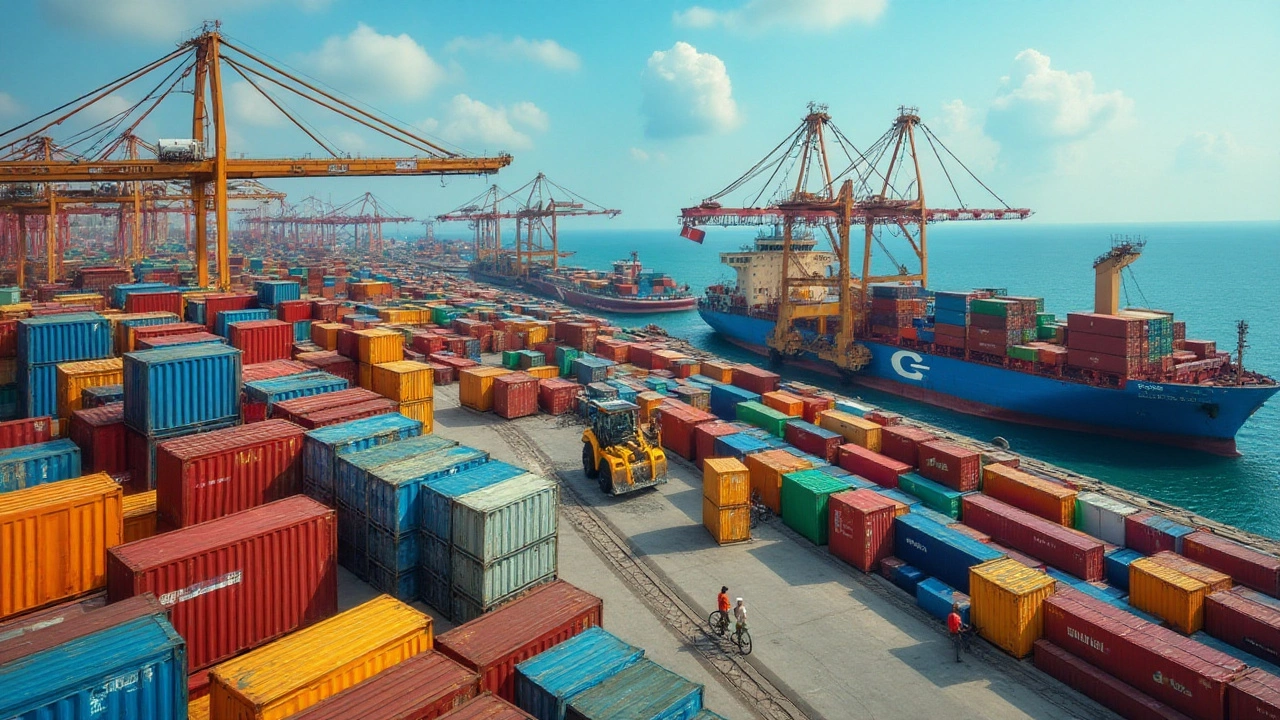
On the bustling stage of global trade, India stands as a significant character, engaging in vibrant exchanges with leading world economies. Delving into the dynamics of India's trade relationships reveals not only the economic grandeur of the subcontinent but also potential pathways for enhancing future trade education.
The magnitude of India's trade with various nations influences not just the bilateral economies but also the global market trends. Understanding these interactions is crucial for those who aim to thrive in the world of commerce, whether they're students, educators, or entrepreneurs.
Join us as we explore India's pivotal trade partners, the nature of traded goods and services, the impact on trade courses, and the future potential for growth in this fascinating arena.
- India's Major Trading Partners
- Goods and Services Exchanged
- Impact on Trade Education
- Opportunities for Future Growth
India's Major Trading Partners
One cannot overstate the strategic importance of India trade relationships on the global economic map. Over the last decade, India has cultivated some profound connections with world-leading economies. A prime example is the United States, which has emerged as a significant trading ally. The bilateral trade between India and the US often includes diverse sectors like technology, pharmaceuticals, and textiles. This relationship has been bolstered by both nations’ commitment to collaborative growth and economic synergy. Such partnerships are not mere transactional; they represent a confluence of ideas and innovations exchanged across borders.
Let's talk about China, a neighboring giant with which the dynamics might occasionally waver due to political or strategic tensions, but the economic ties remain substantial. Chinese electronic goods and machinery are commonplace within the Indian market, proving how intertwined the two economies have become. The relationship isn't one-sided. India exports large amounts of organic chemicals and knitwear to China, creating a balance in trade that helps sustain bilateral relations even during turbulent times.
To speak about the European Union, Germany stands as one of India's most influential trade partners in this bloc. Germany imports a significant amount of Indian services and goods, particularly in the technological sector, amplified by India's growing IT industry. The alliance with Germany isn't limited to commerce; rather, it signifies a blending of cultures and technologies that advances mutual interests on a broader scale. The EU-India trade also encompasses major sectors like automobiles, crucial for the bolstered ties. A diversified portfolio of exports such as apparel, gemstones, and machinery keeps the trade relationships robust.
As noted by the Ministry of Commerce and Industry, "India’s trade with its top partners signifies not only economic development but also the exchange of culture and innovation, creating a rich tapestry of global commerce."
Attention must be drawn to the Middle Eastern countries, especially the United Arab Emirates. Oil trade forms the backbone of this relationship, but there's a lot more than meets the eye. India exports gold, jewelry, and precious stones, crafting an intricate web of trade that generates billions in revenue. The cultural exchanges in this partnership are evident, with a regular inflow and outflow of tourists and workers enriching the volume and value of commerce. Such relationships are essential in establishing India as a formidable presence in Middle Eastern markets.
The Role of Trade Courses in Understanding These Dynamics
The intricate web of global trade with India cannot be fully appreciated without dedicated trade courses and educational pursuits. Understanding the specific trade dynamics helps unravel the complexities involved in balancing these international partnerships. Education provides the tools necessary to foster and develop these economic relationships critically and thoughtfully, laying a firm foundation for those invested in these pursuits.
Thus, for students and professionals eager to delve into global partners and their economic impacts, the need to analyze trade relations cannot be understated. As these connections grow and adapt to the ever-changing landscape of global commerce, being informed and educated about them will provide the necessary edge in any trade-related profession or academic endeavor.

Goods and Services Exchanged
In the intricate dance of international trade, India trade unveils an impressive showcase of goods and services that traverse its borders every year. As one scours through the transactional tapestry, the primary exports from India often center around textiles, pharmaceuticals, information technology services, and agricultural products. On the flip side, India imports a vast array of items including crude oil, machinery, electronics, and pearls, which constitute the backbone of its import economy. The export of technological services, in particular, stands as a testament to India’s prowess in the global tech arena, a domain where Indian companies have established robust partnerships with international corporations, sharing expertise and innovation.
Textiles, including garments and fabrics, feature prominently among India's leading exports, testifying to a rich heritage of craftsmanship revered globally. Several European nations and North America relish Indian textiles, not just for their visual appeal but also for the artisanal value they embody. At the same time, India's emphasis on agriculture is mirrored in its exports of spices, rice, and other agrarian produce. These products find markets ranging from Asia to Africa, influencing dietary practices and culinary trends worldwide. The global reach of these commodities underscores a connection built over centuries, fueled by the relentless pursuit of quality and tradition.
In terms of exports, India's generic pharmaceutical industry continues to make its mark internationally, rivaling even the most established players from the US and Europe. Known for providing cost-effective alternatives to expensive branded medicines, Indian pharmaceuticals are indispensable for healthcare systems globally. This sector not only reflects India's scientific advancements but also portrays its commitment to global health. The fusion of technology and excellence enables Indian firms to set new benchmarks, ensuring accessibility, affordability, and efficacy, fortifying India's position as the 'pharmacy of the world.'
Moreover, India's import sector is diverse and impactful, led primarily by the acquisition of crude oil, which is essential for the country's energy needs. Countries like Saudi Arabia and the UAE are key suppliers, reflecting an intricate network of energy trade that is crucial to sustaining India’s rapid industrial expansion. Electronics, machinery, and heavy equipment from China, Germany, and Japan supplement India's technological landscape, promoting modernization and industrial growth. These imports are vital, not just for consumer demands but also for technological advancements that drive industries forward.
In the context of trade courses in India, comprehending the scope of these goods and services is pivotal. Students and trade professionals can derive immense value from understanding these dynamics, as the knowledge of what travels in and out of India provides an aerial view of economic health and market needs, preparing them to engage effectively in this vast domain. As we continue exploring these exchanges, one must recall the words of a seasoned economist:
"Trade, in its essence, bridges gaps between peoples and nations, fostering not merely economic growth but deeper mutual understanding."Embracing this philosophy enables one to truly appreciate the multifaceted nature of global partners in India's trade journey.

Impact on Trade Education
India's expansive trade relations have a profound influence on trade courses, offering a fertile ground for education systems to evolve and adapt to the changing landscape. By closely examining the flow of goods and services between India and its major trading partners, educators and students can gain invaluable insights into economic strategies, market demands, and international diplomacy. This becomes particularly crucial as nations navigate complex trade agreements, tariffs, and regulatory environments that shape economic success.
Trade education that incorporates India's global partnerships allows students to engage with real-world scenarios, fostering a deeper understanding of economic theories and practices. This approach encourages practical learning experiences, simulating the challenges and opportunities students will encounter in their professional lives. The curriculum often includes case studies on trade negotiations, logistical challenges in exports and imports, and the impact of geopolitical factors on trade policies. Such comprehensive education ensures that students are well-equipped with the necessary skills and knowledge to excel in the vast field of international trade.
Moreover, these educational programs emphasize the importance of understanding cultural nuances and business etiquettes that vary across India's trade partners. Recognizing these differences can lead to more effective communication and negotiations, which are pivotal in fostering strong international business relationships. By integrating these aspects into the trade courses, students not only develop technical expertise but also grow into globally aware professionals who appreciate diverse perspectives.
The evolving nature of global trade requires educational institutions to constantly update their curricula, ensuring alignment with current market trends and technological advancements. Institutions may bring in guest lectures from industry experts, organizing webinars with trade professionals, or even collaborating with international universities for exchange programs focused on trade dynamics. This continuous engagement with the industry helps in bridging the gap between theoretical knowledge and practical application, making trade education relevant and impactful.
Acknowledging the role of technology in revolutionizing trade practices is another critical component of trade education. Emerging technologies such as blockchain, artificial intelligence, and data analytics are beginning to redefine traditional business models. In this context, trade courses that highlight these innovations can provide students with a competitive edge, preparing them for a future where digital prowess will be as crucial as traditional business acumen. By harnessing these technological skills, graduates can contribute to more efficient, transparent, and secure trading processes, eventually driving growth and sustainability in global markets.
"The more you know about the past, the better you are prepared for the future." - Theodore Roosevelt
This quote resonates with the essence of trade education; by learning from the history and the present dynamics of India’s trading relationships, students can build a solid foundation for shaping the future of trade.

Opportunities for Future Growth
India's position in the global trade arena is undeniably growing, and with it, the opportunities for future growth are plentiful. The nation's evolving market dynamics, demographic advantages, and strategic partnerships pave numerous pathways for expansion in trade. A key component to unlocking these future possibilities lies in understanding and leveraging these developments effectively. For instance, India’s population, with over half under the age of 25, promises a booming consumer market and a rich repository of talent eager to engage in international commerce. This demographic dividend is expected to keep the economic engines running strong, with increased consumption and a diverse workforce ready to explore new trades.
Equally important is India's initiative to strengthen its economic ties beyond traditional partners. In recent years, the country has made concerted efforts to negotiate free trade agreements with multiple nations, including the UK and the European Union. These agreements aim to dismantle trade barriers, enhance access to foreign markets, and boost the competitiveness of Indian industries. The International Monetary Fund (IMF) projections suggest that such strategic alliances could bolster India’s GDP growth by significant margins over the next decade.
Moreover, sectors like technology, pharmaceuticals, and renewable energy are showing immense potential for trade expansion. India’s IT industry, for example, is already a global leader and continues to attract substantial investment, reflecting strong confidence in its future growth prospects. The pharmaceutical sector, on the other hand, is rapidly evolving, with India emerging as a major supplier of generic drugs globally. This positions India as a pivotal player in the healthcare supply chain, opening doors to new markets and partnerships.
Another growth avenue is the strengthening of domestic policies that encourage innovation and entrepreneurship. India's "Make in India" initiative is a prime illustration of government-backed efforts to transform the nation into a global manufacturing hub, attracting foreign direct investment and nurturing local startups. This policy not only boosts the domestic economy but also enhances India’s attractiveness as a trading partner.
"India's commitment to becoming a major manufacturing hub is a game-changer for the global economy," notes an article from the World Economic Forum.
Furthermore, as the global emphasis shifts towards sustainability, India is uniquely positioned to lead the charge in renewable energy projects. With its vast natural resources and technological advancements, the country is already investing heavily in solar and wind energy sectors. Such initiatives align with global environmental goals and provide India a competitive edge in the growing green economy.
A look at key economic reports further affirms the optimism surrounding India's trade prospects. As the world's economy becomes more interconnected, India’s strategic geographical location, being centrally located between Europe and Southeast Asia, provides a logistical advantage that can enhance trade routes and reduce shipment times. India trade courses can offer insights into harnessing these opportunities, preparing students and professionals alike to engage effectively in this exciting, evolving market landscape.
